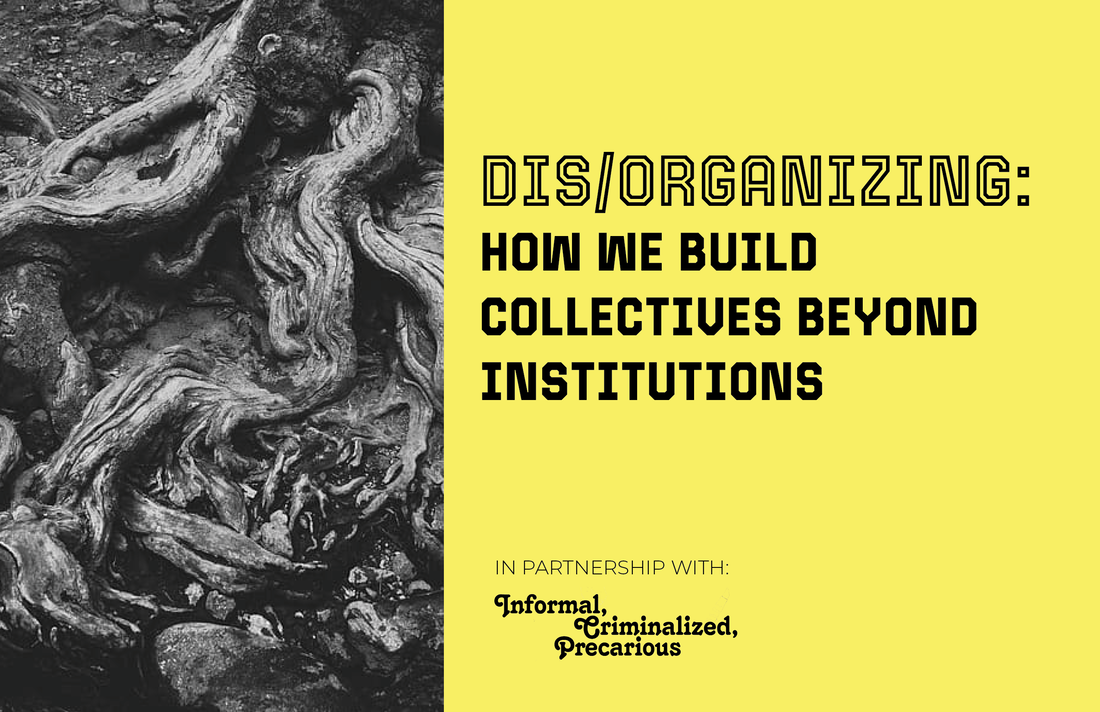|
Dis/Organizing: How We Build Collectives Beyond Institutions a non-comprehensive community toolkit and report by Rachel Kuo & Lorelei Lee This toolkit offers key organizing lessons, strategies, and political visions from migrant worker and sex worker-led political formations: workers who are forcibly excluded from the economy or working in the shadows of formalized economies. This toolkit features a summary of research conducted between February 2021 – July 2021. It also draws from collective learning during the Informal, Criminalized, Precarious: Sex Workers Organizing Against Barriers conference. Why a disorganizing toolkit?
“We’re messy on purpose,” says an organizer building with workers in street economies. Workers pushed into informal economies often create their own informal collectives, networks, and structures for political mobilization and resource sharing. Often, groups are fulfilling needs for people who experience forced exclusion from institutional systems and cannot access resources through existing structures. These formations disorganize exclusive and formal institutions and systems. The idea of dis/organizing emerges from an essay by incarcerated abolitionist organizer Stevie Wilson. By creatively working within and against the system, we can create practices that are disruptive to administrations, bureaucracies, and institutions. At the same time, we must also protect against being disorganized by these same institutional systems. “Government organizations perpetually create a cycle of harm, that then creates cycles where survivors go on to harm others too,” says an organizer working within a survivor-led informal political collective. When groups come together in moments of heightened urgency and necessity, infrastructures may come together quickly. Internal infrastructures and processes, such as decision-making, communication, and leadership development, can be left less clear. Additionally, as groups grow to meet the needs of participating communities, the pace and scale of work can become less sustainable, with individual organizers experiencing exhaustion and burn-out. Yet, in order to maintain their formation and access resources for longer-term sustainability, groups also may be forced to incorporate into the very institutional systems that have created and upheld barriers for participation and resource distribution. This means simultaneous forced exclusion and enforced inclusion. Getting people together can be messy, especially when people have different and uneven material relationships to labor and work that also impact how they participate in activism. For example, members within a collective may also experience various forms of precarity, going from low to no income or from housed to unhoused. Additionally, depending on types of work, access to licenses, and/or immigration status, people will be differentially exposed to systems of criminalization and vulnerability to arrest. Criminalization and stigmatization of workers seeking means of survival impedes and deprives access to resources, including funding, social support, digital platforms, and physical organizing spaces. In this toolkit, we draw from resistance strategies by communities who have been unbanked and un-funded; excluded from communications and financial platforms, social services and social networks, and from most institutions; and unwelcome and policed in public spaces. We share key ideas on ways to build and sustain political collectives, organizations, and formations beyond existing institutions. About the authors: As facilitators of this toolkit, we are simultaneously conveners and participants of multiple movement spaces and political collectives that experience many of the challenges raised. We have questions about the conflicts that come with uncompensated and under-compensated labor in social movements and the issues that arise with fundraising, tax compliance, and organizational formalization. We have also moved between (and continue to work across) different kinds of organizations, institutions, and formations. This toolkit is an attempt to answer some of these questions we continue to struggle with. Rachel Kuo (@rachelkuo) writes about race, social movements, and digital technology. She is a co-founder of the Asian American Feminist Collective. She is currently a Postdoctoral Fellow at the Center for Information, Technology, and Public Life. Lorelei Lee (@MissLoreleiLee) is a sex worker, writer, and activist. You can find their writing in The Establishment, $pread Magazine, n+1, Hustling Verse, and elsewhere. They are a founding member of Survivors Against SESTA; co-founder of the Disabled Sex Workers’ Coalition; and researcher at Hacking//Hustling. This toolkit is made possible through funding by the Social Science Research Council Just Tech COVID-19 Rapid Response grant and supported through the Center for Information, Technology, and Public Life at the University of North Carolina-Chapel Hill.
0 Comments
Leave a Reply. |
Categories
All
|

 RSS Feed
RSS Feed